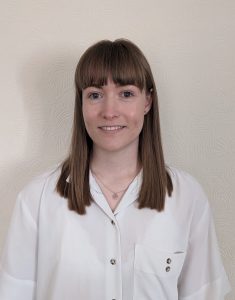Megan Garside: A Model of Social Prescribing for Children’s Specialist Weight Management Services

Megan brings her experience from being a researcher in the R&D team at Leeds and York Partnership NHS Foundation Trust and being part of the Child Oriented Mental Health Innovation Collaborative team (COMIC).
What is your PhD research focused on?
My PhD is looking at how we can use social prescribing in specialist weight management services for children and young people, specifically within Complications of Excess Weight (CEW) clinics. These clinics are NHS-funded and include a multidisciplinary team to provide holistic support for children and young people living with obesity.
Social prescribing is where healthcare professionals link individuals to community-based services to support them with their health and wellbeing. We know that it can be an accessible way to support young people with their mental health and can help to provide regular opportunities for fun physical activity meaning it could be a useful way to support young people living with obesity. I’m working with the local South Yorkshire CEW clinic and local community groups to develop a social prescribing offering for these services.
Why is it an important area of study?
The rates of young people living with obesity are high in the UK. This can have significant impacts on their lives, including both their physical and mental health. There are also impacts on the NHS and cost to the health service both now and in the future. It’s therefore important that there are effective services to support young people who are living with overweight and obesity, and that these services are accessible and acceptable for them.
There’s also a movement towards improving collaborative working with community-based services and increasing understanding around how peer support, physical activity and feeling part of a group can provide mental and physical health benefits. Social prescribing is a growing area of research, particularly for children and young people and so it’s exciting to be part of this.
Tell us about your career/academic journey so far
Since 2017, I’ve worked as a researcher in the R&D team at Leeds and York Partnership NHS Foundation Trust. I work as part of the COMIC team, which stands for the Child Oriented Mental Health Innovation Collaborative. COMIC focuses on mental health research that is child-friendly and accessible and we aim to involve young people in our work as much as we can. I’ve had the opportunity to get involved in loads of great research over the years, including studies such as Cluster Schools, which looked at mental health in secondary schools, and Safety Nets, a social prescribing intervention to support young people on mental health service waiting lists. More recently, my role has focused on bid writing, to apply for funding to support future studies at COMIC.
Why did you choose to study with the AWRC/SHU?
The AWRC has a great, collaborative environment. As the CEW clinic for South Yorkshire is co-located at the AWRC, this provides links to the clinicians and families involved in the service. For me and my PhD, this has been really useful as it means I can meet with the clinical team and have the opportunity to shadow some of the clinics. This has helped to build working relationships and helped to support the involvement of staff and families in the research which has been of benefit to the PhD.
What’s it like being a PhD colocator at the AWRC? What do you enjoy most?
Everyone is so friendly and welcoming! I’ve had the opportunity to get involved in different research groups, (such as the SHU Children and Young People Physical Activity and Sport Research Group) which bring together staff from different departments and backgrounds. I also really like the outdoor space at AWRC, the whole centre is a nice place to work from.
What do you hope to do after your PhD?
I started my PhD at the end of 2022 so finishing still feels a long way off at the moment! Hopefully, I’ll be continuing to work on research projects involving children and young people and will still be collaborating with some of the research groups I’ve been involved in.
Many thanks for speaking to us, Megan, we wish you the best of luck with your studies!
Follow Megan on Twitter.
Find out more about COMIC Research at their website and Twitter.
